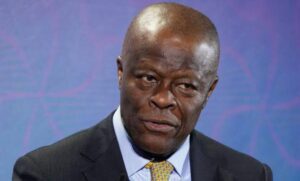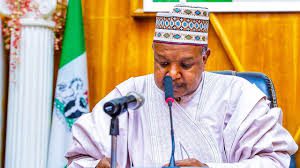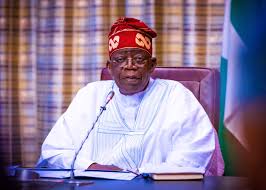
Sustain Buhari’s policy on food production, rice processors urge Tinubu
The Rice Processors Association of Nigeria (RIPAN) has called on the President-elect, Sen. Bola Tinubu, to sustain ongoing initiatives on food production for economic development.
The Director-General of RIPAN, Mr Andy Ekwelem, made the call on Tuesday in Abuja at a news conference.
The Newsmen reports that the theme of the conference was “Strategies for Deepening and Strengthening the Nigeria Rice Sub-Sector towards More Sustainable Development.
According to Ekwelem, RIPAN is an association of investors in integrated rice processing, formed as a direct response to the Federal Government of Nigeria’s deliberate initiative to grow local capacity in rice.
“Members of the association and indeed other actors in the rice processing and milling sub-sector are presently key players and major contributors to the growth of the Nigerian economy.
“Our processing and milling activities contribute several thousands of direct employments and millions of indirect employments to the various stakeholders in the rice value chain and other complementary sectors, ” he said.
He said that the rice industry was the single largest employer of labour in Nigeria, providing jobs for over 13 million people.
“These include direct staff, casual worker, haulage service providers, agrochemical and input suppliers and of course millions of small holder rural farmers who are made up of majorly youths and women,” he said.
According to him, the Nigeria rice industry has enjoyed considerable support from the administration of President Muhammadu Buhari.
“Before the current administration, Nigeria officially allowed imported rice into the country.
“As at the last quarter of 2014, official rice import into Nigeria from Thailand was about 1.24 million tonnes of rice; by the end of 2015, these imports had dropped to about 644,131meric tonnes, and by the end of 2016, it dropped to 58,260 metric tonnes.
“In 2017, the imports further dropped to 23,192 metric tonnes but by 2022, it dropped to an all-time minimal of 438MT.
“The reason for the drops – which to us at RIPAN is a very positive development – is nothing more than Mr President’s hard stand approach against food importation,” he said.
He commended Buhari for his agricultural development initiatives that had boosted food production over the years.
“Recall that President Buhari is a strong advocate of “grow what you eat and eat what you can grow”.
“To ensure that he walked his talk, through the Central Bank of Nigeria (CBN), he launched various programmes that encouraged local production and processing of rice.
” Programme such as the Anchor Borrowers’ Programme, the Paddy Aggregation Scheme, the Private Sector-Led Accelerated Agriculture Development Scheme and the Real Sector Support Facility (RSSF) were floated.
“They where deliberate strategies that encouraged indigenous and foreign business concerns to invest massively in the rice value chain.
“Today, Nigeria boasts of over 100 large-scale integrated rice processing facilities scattered across the country.
“This is more than 700 per cent increase from the mere 13 integrated mills operating in the country between 2010 and 2014,” he said.
He also commended Buhari for his various initiatives to encourage consumption of locally produced rice.
“To ensure that product dumping and other forms of international trade malpractice do not affect the huge private-sector investments as well as the various programmes of government, the CBN placed restrictions on importation of food items including rice.
“The apex bank did that by categorising them as not valid for foreign exchange from the CBN’s Foreign Exchange Window.
“To further protect and strengthen the industry, the administration introduced the Border Restriction Policy of 2020,” he said.
He said that before the border restriction policy, there was a maddening proliferation of all manner of items and food stocks, even light arms and small weapons into Nigeria.
“Fortunately, with the Border Restriction Policy of the Buhari administration, the menace was effectively stemmed between the period starting August 2020 and the end of 2021.
“As a matter of fact, over 1.2 million metric tonnes of rice imported to Benin from India and Thailand between May 2019 and August 2019, became trapped in Benin.
“This caused the imports of rice from India to Benin to drop from a monthly average of 75,000 metric tonnes between January and September 2019 to less than 2,000 metric tonnes in the last quarter of 2019.
“Also, the volume of Thai rice imported to Benin Republic fell from a monthly average of 100,000MT to 5,000MT tons by November 2019.
The dividend of all these was that the demand for Nigerian home grown and locally processed rice increased quite immensely, causing an increase in both the production of paddy rice as well as rice processing facility, ” he said.
According to him, in 2020 during the COVID era, Nigerian farmers produced as much as 8.2 million metric tonnes of paddy rice and another 8.4 million tonnes in 2021.
“At the time, all of the paddy produced were off taken by the rice processors/ millers who processed them and supplied good quality finished rice to Nigerians.
” Even as the borders were closed and COVID Pandemic raged on, Nigeria did not suffer lack of food, particularly rice,” he said.
He, however, said that the situation began to deteriorate again after the borders were reopened.
He called on the incoming Tinubu’s administration to emulate some of the laudable policies of the Buhari administration to boost food production.
“The numbers in metric tonnes of paddy rice produced by Nigerian farmers began to decline after the borders were reopened in 2022.
“Smuggling also commenced again in earnest, causing a drop in the volume of paddy offtake by the rice processors/millers.
“Indeed, it is on record that upon the reopening of our borders, official rice import to Benin republic from Thailand rose from meagerly monthly average of 5,000 MT in 2019 to a monthly average of 26,861MT in 2022.
“RIPAN hopes that the incoming administration will follow through some of the laudable policies of the current administration as well as design and launch new ones to further strengthen and sustain the Nigeria Rice Industry,” Ekwelem said.
On prices, he said that Nigerian rice were most affordable, adding that the expensive rice were the imported ones which people wrongfully refer to as local rice.
“No Nigerian rice costs more than N31,000 ex factory price, ” he said.



